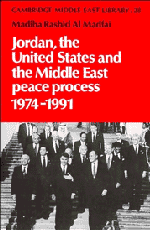Book contents
- Frontmatter
- Contents
- Foreword by William B. Quandt
- Acknowledgements
- Prologue
- 1 Introduction
- 2 Kissinger's legacy and imprint on the Middle East
- Part I Jordan in the Carter Middle East policy
- Part II Jordan in the Reagan Middle East policy
- Part III US, Jordan and Arab approaches to peace
- Appendices
- A Comparison of Middle East peace proposals
- B Jordan–US exchange of questions and answers on the Camp David Accords, September 1978
- C US assistance to Jordan 1975–1989
- D Arab assistance to Jordan paid in accordance with the 1978 Baghdad Summit Conference and 1980 Amman Arab Summit
- E Peres–Hussain Agreement (The London Document), 11 April 1987
- F Shamir's Four-point plan, April 1989
- G Baker's Five-point plan, December 1989
- H Invitation to Madrid Peace Conference, 18 October 1991
- I Letter of Assurances to the Palestinians, 18 October 1991
- Notes
- Select bibliography
- Index
- Cambridge Middle East Library
B - Jordan–US exchange of questions and answers on the Camp David Accords, September 1978
Published online by Cambridge University Press: 25 February 2010
- Frontmatter
- Contents
- Foreword by William B. Quandt
- Acknowledgements
- Prologue
- 1 Introduction
- 2 Kissinger's legacy and imprint on the Middle East
- Part I Jordan in the Carter Middle East policy
- Part II Jordan in the Reagan Middle East policy
- Part III US, Jordan and Arab approaches to peace
- Appendices
- A Comparison of Middle East peace proposals
- B Jordan–US exchange of questions and answers on the Camp David Accords, September 1978
- C US assistance to Jordan 1975–1989
- D Arab assistance to Jordan paid in accordance with the 1978 Baghdad Summit Conference and 1980 Amman Arab Summit
- E Peres–Hussain Agreement (The London Document), 11 April 1987
- F Shamir's Four-point plan, April 1989
- G Baker's Five-point plan, December 1989
- H Invitation to Madrid Peace Conference, 18 October 1991
- I Letter of Assurances to the Palestinians, 18 October 1991
- Notes
- Select bibliography
- Index
- Cambridge Middle East Library
Summary
Question One
Does the US intend to be a full partner in the negotiations on the West Bank, Gaza Strip and the Palestinian question in general? At what stage of the negotiations would the US participate and what role would it play?
Answer
Yes. The US would be a full partner in all stages of the Arab-Israeli peace negotiations, leading to a just, durable and comprehensive peace in the Middle East. The US would use its full influence for a successful conclusion. President Carter would play a personal active role in the negotiations.
Question Two
What does Paragraph (A) of the Framework for Peace – referring to representatives of the Palestinian people – mean?
Answer
There was no attempt to give a comprehensive explanation. The people of the West Bank and Gaza are specified in some cases. On one occasion, the paragraph referring to ‘other Palestinians as would be agreed’ clearly means representatives from outside theWest Bank and Gaza, not necessarily Egyptian or Jordanian representatives. Of course Palestinians who are Egyptian or Jordanian citizens may become members of the negotiating delegations representing Jordan or Egypt. In other cases the Selfgoverning Authority is mentioned.
The US explains the term ‘Representatives of the Palestinian People’ not on the basis of any authority or a single organization representing the Palestinian people, but as including those elected or chosen to participate in the negotiations.
- Type
- Chapter
- Information
- Publisher: Cambridge University PressPrint publication year: 1993



